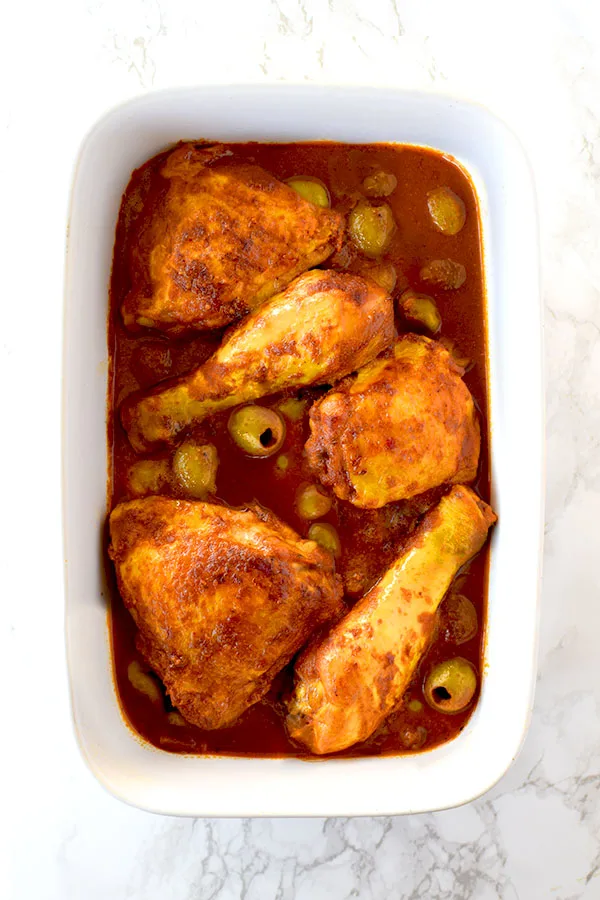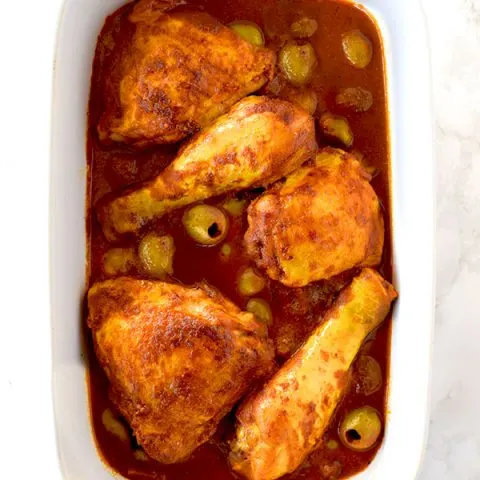Moroccan chicken with olives is simmered in tomato sauce and filled with flavorful spices. Serve with white rice or couscous.

I love Mediterranean and Middle Eastern food.
These cuisines incorporate spices into their cooking to give it lots of flavor.
This dish is no exception as it calls for sweet paprika, cumin, and turmeric.
Also, like some Middle Eastern foods, this dish is inherently spicy. However, you can leave the hot pepper out if you prefer. Either way, it’s a delicious dish.
One of the things I like most about this dish is the colors. I love the way the yellow chicken stands out against the red sauce.
In fact, that was one of the things that drew me to it in the first place. The yellow color comes from the turmeric, which is likely its main use in this recipe.
This may seem like a complicated recipe when you see the relatively long list of ingredients. However, like Moroccan Meatballs with Olives and Moroccan Fish, it’s really easy.
Just boil olives, fry the vegetables, add everything to the pot and simmer. Done.
In fact, if you want, you can make this a one pot recipe. Just cook the olives in the same pot you’ll be using later, pour the water out, and set them aside.
You can serve this dish along with couscous or white rice.
If I had to guess, I’d say traditionally it is served with couscous.
However, if you don’t have it around, I often serve it with Israeli white rice.
IS KOSHER CHICKEN BETTER?
Kosher animals are kept in better conditions than non-kosher animals due to strict kosher health requirements of the animals.
Also, the salting process used as part of the process of making meat kosher is similar to dry brining, and therefore produces a better quality meat.
While I’ve only eaten kosher meat so I cannot compare, I’ve been told by non-Jews who do not keep kosher that they’ve noticed that kosher chicken is of superior quality to cook with.
SHOULD YOU WASH CHICKEN?
According to the USDA, you should not wash meat or poultry, since water can splash bacteria up to 3 feet surrounding your sink.
A study done by Drexel University shows that it is best to move meat and poultry directly from package to pan. The heat from cooking will get rid of any bacteria that may be present.
HOW CAN I CLEAN MY CHICKEN WITHOUT WASHING IT?
If you want to clean your chicken without washing it, wipe it down with a wet paper towel.
Just make sure the paper towel doesn’t touch anything else and to toss the paper towel right away.
HOW TO DEFROST CHICKEN
IN THE FRIDGE
Defrosting chicken in the fridge is the most highly recommended.
To do this, place the frozen chicken in a pan and let it thaw. Oftentimes, when chicken thaws, it releases liquids that can leak onto your fridge, so the pan is really helpful.
Chicken typically takes a full day to thaw. Once thawed, it can remain in the refrigerator for a day or two before cooking.
IN COLD WATER
Defrosting chicken in water should take two to three hours.
Submerge your sealed chicken in a pot or bowl full of cold water. Change out the water every 30 minutes or so.
Do not hot use water because it can start cooking your chicken.
Can you cook FROZEN chicken?
According to the USDA, you can cook frozen chicken. It will take 50% longer to cook, but it’s an option.
You should also cook it on a roasting rack or over vegetables so that the heat can circulate around the chicken.
CAN YOU REFREEZE RAW CHICKEN?
According to the USDA, “food thawed in the refrigerator is safe to refreeze without cooking.” However, you do lose quality when refreezing previously defrosted meat.
Every time you defrost meat, it loses moisture as it thaws, which also leads to a loss in flavor. To compensate for this, marinate the chicken to add more flavor and juice.
The USDA also says not to “refreeze any foods left outside the refrigerator longer than 2 hours; 1 hour in temperatures above 90°F.”
SHOULD YOU BRINE?
Brining actually doesn’t do anything to help poultry. In fact, it makes it soggy rather than juicy, with watered-down flavor.
Aromatic brines and stock don’t help with flavor either. This is because the salt pulls water molecules in, leaving most of the flavor behind.
DRY BRINING
A dry brine, on the other hand, loosens up muscle fibers, allowing them to retain more moisture without adding any excess liquid.
Initially, the salt draws moisture out, then it dissolves in this liquid, creating a concentrated brine, which eventually gets reabsorbed. This leads to more intensely flavored results.
An added benefit is that it also requires less space and mess than a water brine. Not to mention the fact that it allows for crispier skin.
CAN YOU DRY BRINE KOSHER chicken?
Food experts are often under the impression that kosher meat and poultry cannot be brined and dry brined.
This is because of the koshering process, which involves salting the meat. However, the process is not nearly as long as the dry brining process, and unlike a dry brine, the poultry is soaked to remove the salt.
So, since the process is different than a dry brine, it is fine and even recommended to dry brine kosher poultry and meat.
How do you dry brine chicken?
Begin by patting the chicken with paper towels. This will help the salt adhere to the chicken.
Grab pinches of kosher salt and sprinkle it over the chicken until the chicken is generously salted and evenly coated.
Place the dry-brined chicken on a rack or a plate and refrigerate it. Refrigerate chicken pieces for at least 1 hour, skinless pieces for 30 minutes to 1 hour or up to about 12 hours, and a whole chicken for 8-24 hours.
Once the waiting period is up, there is no need to rinse off the chicken. Just cook it as usual.
HOW TO STORE CHICKEN
Place cooled chicken in an airtight container or wrap in heavy-duty aluminum foil or plastic wrap. Store in the fridge for up to 4 days.
HOW TO FREEZE CHICKEN
Freeze leftovers within 3-4 days. Place cooled chicken in an airtight container or resealable freezer bag.
Freeze for up to 4-6 months. After that, it is still safe to eat, but the quality begins to degrade.
Recipe Tip:
Among Israeli-Moroccans, it is common to add chicken bullion powder instead of salt. The bullion powder is already salted and adds extra flavor.
Moroccan Chicken with Olives

Chicken with olives is a Moroccan classic. Serve with white rice.
Ingredients
- 2 cups pitted olives (360 grams)
- 4-5 chicken legs, cut
- 2 tablespoons oil
- 6 garlic cloves sliced
- 2 tomatoes, chopped
- 1 to 2 cups hot water
- 1 to 2 tablespoon tomato paste
- 1 tablespoon sweet paprika
- 1 tablespoon cumin
- 2 teaspoon turmeric
- 1 hot pepper, optional
- Salt
- Pepper
Instructions
- Boil the olives in fresh water for 30 minutes or until you can slide a fork through them with ease. Spill out the water.
- Heat the oil. Sauté garlic and tomatoes.
- Add chicken, olives, and enough water to partially cover the sides.
- Mix in tomato paste, paprika, cumin, turmeric, and hot pepper if desired. Salt and pepper to taste.
- Bring to a boil. Lower to a simmer. Cook for 40 minutes.
Nutrition Information:
Yield:
8Serving Size:
1Amount Per Serving: Calories: 391Total Fat: 22gSaturated Fat: 5gTrans Fat: 0gUnsaturated Fat: 15gCholesterol: 205mgSodium: 501mgCarbohydrates: 7gFiber: 2gSugar: 2gProtein: 40g
Anick
Thursday 14th of May 2020
How did you season your chicken?
ElissaBeth
Thursday 14th of May 2020
The chicken does not need to be seasoned. It gets plenty of flavor from the sauce and olives. Just cook as instruction.
Miranda
Tuesday 7th of April 2020
A gorgeous recipe, my kids are crazy about it. I make the olives separately as they are not fans of olives but I love them. I add cubes potatos to the chicken in sauce. So so yummy! Just made a double batch for pesach. Thank you! Chag sameach
ElissaBeth
Tuesday 7th of April 2020
I'm really glad to hear you and your kids like it! Thank you for sharing that with me :)
Harold
Wednesday 10th of April 2019
What do I do with the boiled olives?
ElissaBeth
Wednesday 10th of April 2019
You add it the same time as you add the chicken and water :)